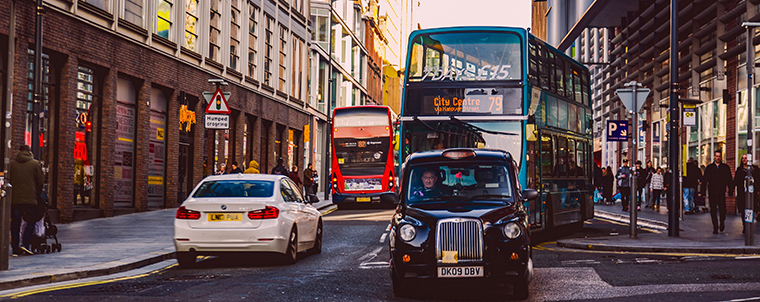Access to car or good public transport essential to leading fuller life, study finds

Good transport connections are essential for improving opportunities for work, socialising and wellbeing, new research by the University of the West of England (UWE Bristol) with NatCen for the Department of Transport has found.
The research shows that the existence of jobs and services in a region is not enough, and that people need the means to reach them. These findings will help inform government decisions on public spending and transport investment.
The study looked at the extent to which people have access to cars, the availability of buses where they live and their perception of local public transport quality. It examined how transport access affected their employment, their incomes, and their ability to access services and participate in social activities. The study also examined whether transport availability affected loneliness, stress levels, life satisfaction and mental health.
This was analysed using two large, national longitudinal data sets: Understanding Society which covers the full age range of the UK population and the English Longitudinal Study of Ageing which covers over 50 year olds. Both surveys contain representative samples of the population and involve interviewing the same people regularly, making it possible to investigate how the lives of individual people are changing over time.
Dr Kiron Chatterjee, an Associate Professor in Travel Behaviour from UWE Bristol's Centre for Transport and Society and the report's lead author, said: "Transport access is highly uneven among the population. While over two-thirds (69%) of adults aged 16 and over living in England have access to a car they can drive, car availability is much lower for 16-24 year olds, those from BME groups, those with mobility impairments, those that live alone, those who are unemployed and those with low incomes. These groups make more use of buses as a result.
"However, people with low incomes are just as likely to use a car as those with higher incomes, despite more limited personal car access; 84% of those with a monthly income of less than £500 travel frequently by car (at least once a week) but only 41% have personal car access. This suggests that people with low incomes rely on lifts from others in their household or in their wider social network."
The study goes on to show that access to transport makes a big difference to people's life opportunities. For example, an unemployed person who has car access is over twice as likely to move into work the following year than someone without car access. Having a car was found to matter more outside London and other metropolitan areas which is consistent with the widely held belief that a car is essential outside the big cities.
When it comes to being able to access essential services such as healthcare, food shops and learning facilities, the study showed that this is much more likely for those with personal car access or those with shorter public transport journeys. This also applies to being able to participate in social activities, showing transport is important both for life's necessities and for social interaction.
Dr Ben Clark from the Centre for Transport and Society, who contributed to the study, said: "Good public transport is associated with lower strain in people's lives and greater life satisfaction, while for the older population having access to a car as driver makes them less likely to feel lonely."
The study is the first of its kind to look at the big picture for how transport affects lives across the whole population. Dr Chatterjee said: "I hope that this new research will be followed up by studies looking more closely at specific groups who are at particular risk of compromised life chances as a result of inadequate transport."
One such study was released last month by UWE Bristol and walking and cycling charity Sustrans, with a report on the impact of transport on the future health of young people. The research was commissioned by independent charity the Health Foundation, which conducted a two-year inquiry to build an understanding of the influences affecting the future health of young people. The research concluded that young people should be prioritised in transport spending and that more should be done to ensure they have better access to affordable, good quality transport, particularly for reaching places of work and education providers.
Related news

10 February 2026
Work by UWE Bristol lecturer features in Government’s National Cancer Plan
Work by a UWE Bristol academic has been included in the Government’s National Cancer Plan.

23 January 2026
On-demand minibus services beneficial in rural areas but face financial challenges, trials suggest
Trials of ‘demand responsive transport’ minibus services boosted connectivity for people in rural and suburban areas, according to a new report produced by UWE Bristol researchers.

18 December 2025
UWE Bristol professor appointed National Institute for Health and Care Excellence CEO
Jonathan Benger CBE, Professor of Emergency Care at UWE Bristol, has been appointed as the new chief executive officer of the National Institute for Health and Care Excellence (NICE).

17 December 2025
Findings revealed from first UK study into experiences of mothers who are survivors of rape pregnancy
UWE Bristol academics have revealed the findings of the first UK-based study of the experiences of mothers who are survivors of rape pregnancy.

11 December 2025
Social media influencer work is far more demanding than it looks, research finds
A study exploring the mental health impacts of social media influencer work has revealed that life online is far more demanding than it appears.

25 November 2025
UWE Bristol experts join film Q&A exploring music and melodrama
Academics will take part in the Cary Comes Home Festival, with a post-screening Q&A exploring music, melodrama and emotional storytelling in classic cinema.

17 November 2025
Urgent reform needed to support ambulance-delivered end of life care, study finds
More than three quarters (78 per cent) of paramedics sometimes fear doing the wrong thing when caring for people in the last year of life, new research has found.

13 November 2025
Bristol’s screen industry experiences “boom-and-bust cycle” after post-pandemic recovery, new research from UWE Bristol finds
New research from UWE Bristol provides detailed insight into Bristol's screen sector.

13 November 2025
New AI research to revolutionise animal welfare
A UWE Bristol research project will combine behavioural science and AI to create technology that understands not only what animals do, but how they feel.

10 November 2025
Lessons from Low Traffic Neighbourhoods will drive better public engagement, study finds
Lessons from Low Traffic Neighbourhoods have informed a new toolkit to improve engagement with the public on challenging local street issues.

06 November 2025
First-of-its-kind study aims to help more people spend their final days at home
A new study will explore how architectural design could support end-of-life care in domestic settings.

29 October 2025
UWE Bristol academic unveils breakthrough in energy-efficient AI at NATO science forum
Dr Jonathan Lancelot has developed a new form of AI that could transform how intelligent machines operate in space, defence, and remote environments.






